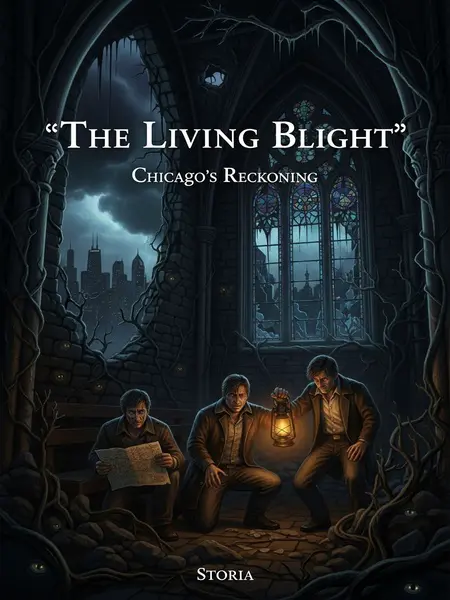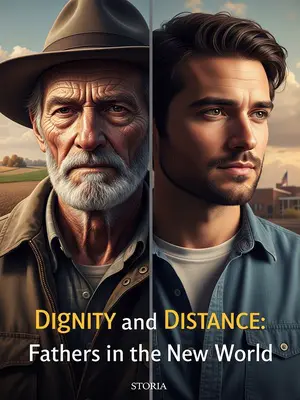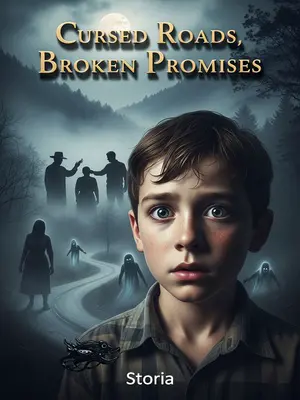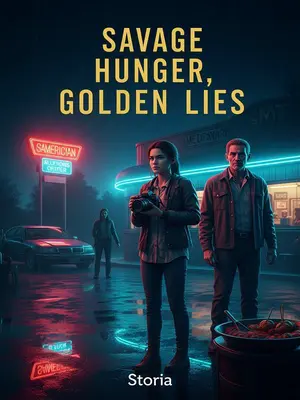Chapter 3: Graveyard Confessions
The sound was wet and awful, echoing down the hallway. Parker gagged, the metallic tang of blood thick in the air.
It fell through the window in front of Parker, and in the moonlight, he saw it was a lump of bloody, viscous flesh.
It hit the floor with a sickening splat, steam rising in the cold. Parker’s mind snapped, horror flooding every thought.
Parker couldn’t take it. He rolled out of bed, bolted from the house, and ran into the street, screaming in terror into the predawn dark.
He didn’t stop until he hit the next block, feet pounding the frozen pavement, his screams bouncing off darkened storefronts and empty L tracks. He didn’t care who heard—he just wanted out.
That very night, he called the cops, voice shaking. I sent a patrol car right away, my own hands trembling as I listened to his story.
When they arrived, the old woman was gone. Only Joey’s blackened, reeking corpse lay in the living room, a long trail of blood and the lump of flesh he’d puked up.
The officers gagged at the stench, covering their faces with their sleeves. The place felt cursed—Joey’s body twisted, the air thick with rot and something worse.
You can guess—Joey’s symptoms matched what would soon sweep through Chicago.
The EMTs said they’d never seen anything like it. The medical examiner just shook his head, already fearing what was coming.
Naturally, the police started looking for the old woman and soon caught her. The arresting officer said not only did her eyes look like a bird’s, but her hands were freakish too—long, thin fingers, the skin wrinkled and tough, knuckles bent like a hawk’s claws. She looked like something out of a nightmare.
Officer O’Malley, a big guy, said he’d never been so rattled. He cuffed her, but she barely fought, just stared at him with those bird eyes, her hands twitching.
They brought her back to Maple Heights and asked what to do. I figured, a monster like that didn’t deserve a trial—she should burn.
It was a gut decision, made out of fear. The townsfolk gathered in the back lot, anger and dread thick as smoke. The old woman didn’t beg—she just watched, unblinking.
So the officers built a pyre, tied her up, and set it alight.
The flames caught fast, wood hissing and popping. The crowd stood silent, the only sound the fire and the woman’s screams.
Before she burned, the old woman wailed her innocence, saying she was from Willow Creek outside the city and had come to find her son, Henry Sampson. But her voice was chilling, almost inhuman. As the flames swallowed her, she shrieked, the sound more bird than woman.
Her voice rose, echoing off the stone. Some folks covered their ears, others crossed themselves or whispered old prayers about fire driving out evil. Even now, I hear that scream in my sleep.
I thought her death would end it. But within days, more and more people in Chicago came down with the same sickness as Joey. They’d vomit up bloody flesh, again and again, until they died, bodies turning black and purple. Even Parker, who took her in, and O’Malley, who arrested her, both got sick and died.
Panic spread faster than the disease. Hospitals overflowed, the morgue filled up. The news called it the "Maple Heights Plague." Nobody wanted to talk about where it started.
Investigation showed every victim had crossed paths with the old woman.
The city’s contact tracers worked overtime, piecing it all together. Every thread led back to her—her and those damned bird eyes.
Evil omens in evil times. Afraid of the mayor’s anger, I banned any mention of the old woman. Most who’d seen her were dead anyway, so few knew the truth.
I sealed the files, swore the officers to silence, and we burned what evidence we could. But secrets have a way of leaking out, especially when the dead keep piling up.
As for the old woman’s end, no one really knows.
Some say her ashes blew out over the prairie, others that her bones still lie beneath this chapel. Me, I just hope she’s gone for good—but I wouldn’t bet on it.
Marcus finished, his breath fogging in the cold. He glanced at David, who sat silent, staring at the fire. Turning to Eli, he saw the lieutenant’s jaw was set, eyes haunted.
The fire burned low, casting long shadows across the broken pews. Outside, the prairie wind screamed, rattling the chapel’s doors. For a moment, nobody spoke. It felt like the old woman’s ghost was listening, waiting.
The wind battered the chapel, whistling through broken glass. Other sounds—strange, half-heard—drifted closer to the ruined walls, but the three inside paid them no mind.
Somewhere overhead, a loose shingle banged in the gale, adding to the unease. The embers glowed in the darkness, and the night pressed in.
Suddenly, Eli spoke. "You said the old woman was looking for Henry Sampson?"
His voice was low, nearly lost in the wind. He stared at Marcus, eyes narrowed, weighing every word.
Marcus nodded.
He shifted in place, glancing at David as if searching for help. The firelight glimmered on the sweat at his brow.
Eli said, "Funny how things work out. Henry Sampson was actually one of my patrolmen. I saw his promise and made him my personal guard—had him tell folks he was my cousin, called himself Eli Sanders."
He let the words hang. The fire crackled, and for a moment, only the wind answered.
"What?" Marcus and David looked at each other, stunned.
David’s mouth dropped open, Marcus let out a breathless, disbelieving laugh.
"Then...where is he now?" Marcus asked.
His voice shook, the question hanging in the air like a dare.
"He’s...dead," Eli said.
He looked at the others and began to tell Henry Sampson’s story, his voice flat but hands trembling. The fire burned lower, shadows shifting on the walls.
Henry Sampson joined the city patrol three years back. I liked his grit and honesty, so out of all the new guys, I looked out for him, made him my personal guard.
He was a good kid—quiet, dependable, the sort who’d help you move a couch without complaint. Maybe I saw a little of myself in him. That’s probably why I kept him close.
But I worried the others would get jealous, so I had him take the name Eli Sanders and pretend to be my cousin.
It’s an old Chicago trick—keep the best close, give them a new name, and nobody asks questions. In the patrol house, family’s family, especially in a place like this.













